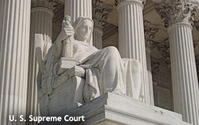
Siding with television broadcasters, the U.S. Supreme Court today ruled that the online video service Aereo infringes copyright by streaming live television programs to its subscribers' smartphones
and tablets.
The 6-3 ruling, which reverses a pro-Aereo decision by the 2nd Circuit Court of Appeals, likely will force the Barry Diller-backed cord-cutting service to either shut down or
significantly revamp its business model.
The dispute between the broadcasters and Aereo dates to 2012, when the start-up launched in New York City. A coalition of broadcast networks
promptly sued the company, arguing that it infringed copyright by “publicly performing” television shows without a license.
Aereo countered that its performances were
“private” -- and therefore didn't require licenses -- due to the company's technology. Aereo uses dime-size antennas to capture programs and stream them on an antenna-to-user basis. The
start-up said that the one-to-one nature of the streams meant they weren't public.
The Supreme Court disagreed with Aereo, ruling today that its “behind-the-scenes” architecture
was irrelevant to the legal question. “Why would a subscriber who wishes to watch a television show care much whether images and sounds are delivered to his screen via a large multi-subscriber
antenna or one small dedicated antenna?” wrote Justice Stephen Breyer for the majority.
“When an entity communicates the same contemporaneously perceptible images and sounds to
multiple people, it transmits a performance to them regardless of the number of discrete communications it makes.”
Breyer also wrote that Aereo's service was similar to that offered
more than 40 years ago, by the original “community antenna TV” companies. Those companies -- which set up antennas on hills and then carried the signals into subscribers' homes via coaxial
cable -- originally offered people better reception than they could get with rabbit ears.
When the broadcasters challenged those companies in court, the Supreme Court sided with CATV
providers. Congress responded by rewriting the copyright law in 1976, to make clear that CATV companies can't transmit programs without licenses.
Breyer said in his opinion that Aereo
offers the same type of service that Congress aimed to address with its 1976 changes. “Having considered the details of Aereo’s practices, we find them highly similar to those of the CATV
systems,” he wrote. “And those are activities that the 1976 amendments sought to bring within the scope of the Copyright Act.”
It's not clear yet what Aereo's next step
is, but industry observers doubt it will be able to continue with its current business plan.
“Aereo's out of business. All of the Aereo copycats need to find something else to
copy,” says University of Maryland law professor James Grimmelmann, who has followed the case closely.
One Aereo copycat, FilmOn X, backed by billionaire Alki David, was largely shut
down by the courts before today's decision.
Aereo CEO and founder Chet Kanojia called today's decision “a massive setback for the American consumer.”
He added: “We
are disappointed in the outcome, but our work is not done. We will continue to fight for our consumers and fight to create innovative technologies that have a meaningful and positive impact on our
world.”
It's also not yet clear what the decision means for cloud computing services. A host of outside technology companies had expressed concern that an anti-Aereo ruling could pose
a risk to digital storage lockers, which allow stream content from remote lockers to people's computers.
Breyer largely sidesteps those issues in the opinion, writing that the court isn't
now addressing how the copyright law “will apply to technologies not before us.” He specifically adds that the court isn't considering whether remote storage systems infringe copyright.
Some legal experts say that language could protect cloud computing services from copyright infringement liability. “The impact on the cloud computing industry is overblown,” says
Andrew Goldstein, a media and entertainment attorney with Freeborn & Peters. “The Supreme Court's majority opinion did as good a job as it could in trying to emphasize that this was a
narrow, limited opinion.”
But Grimmelmann isn't convinced. “We're going to have some uncertainty for consumer electronics and cloud service providers,” he says
advertisement
advertisement
.